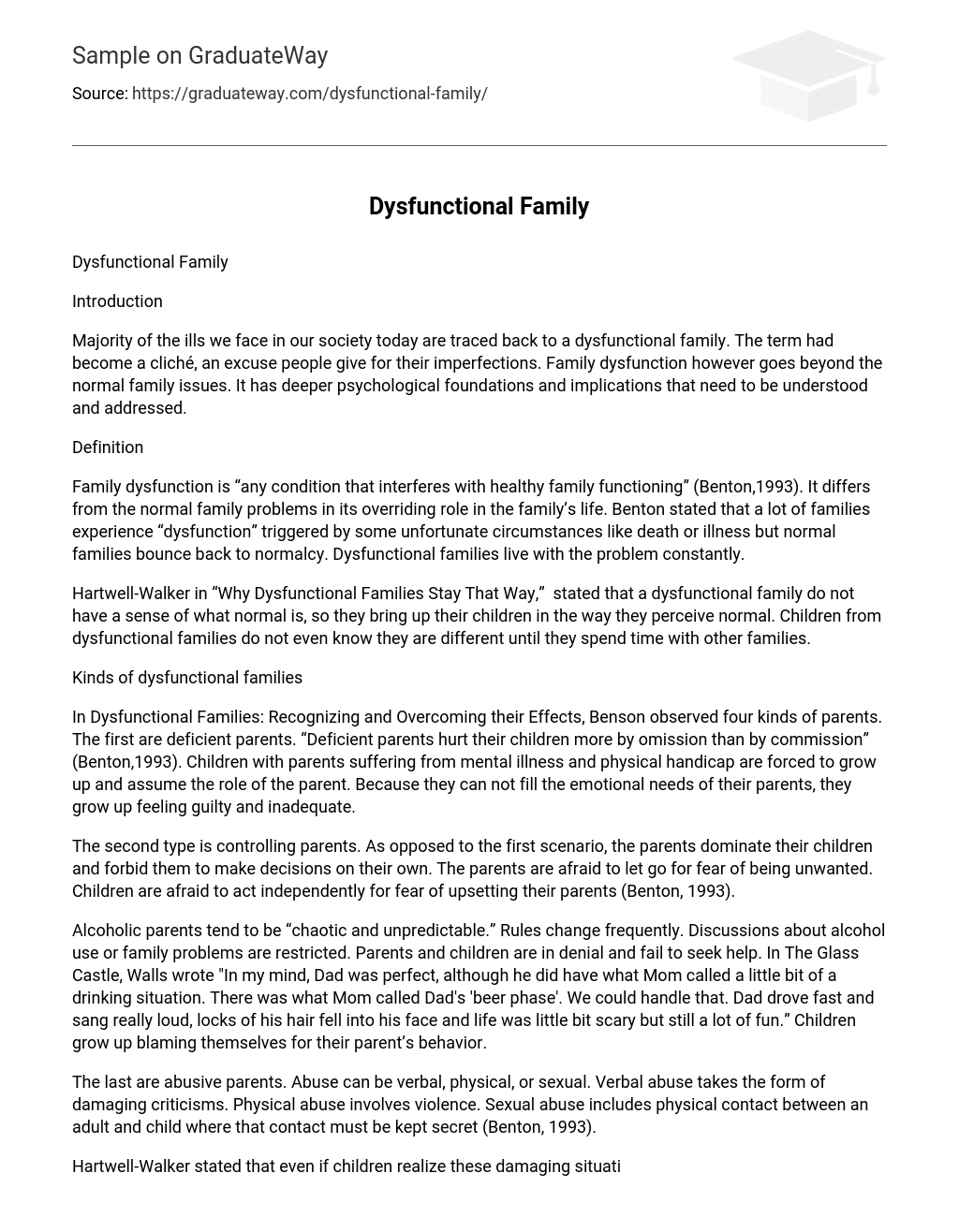Introduction
Majority of the ills we face in our society today are traced back to a dysfunctional family. The term had become a cliché, an excuse people give for their imperfections. Family dysfunction however goes beyond the normal family issues. It has deeper psychological foundations and implications that need to be understood and addressed.
Definition
Family dysfunction is “any condition that interferes with healthy family functioning” (Benton,1993). It differs from the normal family problems in its overriding role in the family’s life. Benton stated that a lot of families experience “dysfunction” triggered by some unfortunate circumstances like death or illness but normal families bounce back to normalcy. Dysfunctional families live with the problem constantly.
Hartwell-Walker in “Why Dysfunctional Families Stay That Way,” stated that a dysfunctional family do not have a sense of what normal is, so they bring up their children in the way they perceive normal. Children from dysfunctional families do not even know they are different until they spend time with other families.
Kinds of dysfunctional families
In Dysfunctional Families: Recognizing and Overcoming their Effects, Benson observed four kinds of parents. The first are deficient parents. “Deficient parents hurt their children more by omission than by commission” (Benton,1993). Children with parents suffering from mental illness and physical handicap are forced to grow up and assume the role of the parent. Because they can not fill the emotional needs of their parents, they grow up feeling guilty and inadequate.
The second type is controlling parents. As opposed to the first scenario, the parents dominate their children and forbid them to make decisions on their own. The parents are afraid to let go for fear of being unwanted. Children are afraid to act independently for fear of upsetting their parents (Benton, 1993).
Alcoholic parents tend to be “chaotic and unpredictable.” Rules change frequently. Discussions about alcohol use or family problems are restricted. Parents and children are in denial and fail to seek help. In The Glass Castle, Walls wrote “In my mind, Dad was perfect, although he did have what Mom called a little bit of a drinking situation. There was what Mom called Dad’s ‘beer phase’. We could handle that. Dad drove fast and sang really loud, locks of his hair fell into his face and life was little bit scary but still a lot of fun.” Children grow up blaming themselves for their parent’s behavior.
The last are abusive parents. Abuse can be verbal, physical, or sexual. Verbal abuse takes the form of damaging criticisms. Physical abuse involves violence. Sexual abuse includes physical contact between an adult and child where that contact must be kept secret (Benton, 1993).
Hartwell-Walker stated that even if children realize these damaging situations, they do not have the capability to escape. They are trapped to deal with their families.
Treatment
Children from dysfunctional families develop unique instincts for survival. They tend to overcompensate in other areas of their life to cover up their past. However, the tend to doubt their intuition and emotion which affects the way they relate to other people (Benton 1993).
The best possible treatment is to seek professional help. They need to express their pent up emotions and deal with the issue. This is not easy after years of denial and abuse. Benton suggested starting with a journal the progressing to trusting other people.
Summary
The hardest thing about dysfunctional family is accepting the fact that your own parents, the people who are supposed to take care of you can cause you harm. “A child’s most important duty is to protect the image of their parents and family in the community” (Fischer 2004). Instead of getting help, dysfunctional families withdraw from society to the intimacy of their secret lives, making it hard for other people to extend help.
Works Cited
Benton, Sheryl A. “Dysfunctional Families: Recognizing And Overcoming Their Effects.” 1993. Counseling Services. 7 July 2009 < http://www.k-state.edu/counseling/topics/relationships/dysfunc.html >
Fischer, Thomas F. “Ten Commandments of Dysfunctional Families.” 5 October, 2004 Ministry Health, LLC. 7 July 2009 <http://www.ministryhealth.net/mh_articles/064_ten_commandments_of_dysfunctional_families.html>.
Hartwell-Walker, Marie. “Why Dysfunctional Families Stay That Way.” 27 January 2000. Psych Central. 7 July 2009 < http://psychcentral.com/library/id23.html>.
Walls, Jeannette. The Glass Castle: A Memoir. USA: Scribner, 2005.





